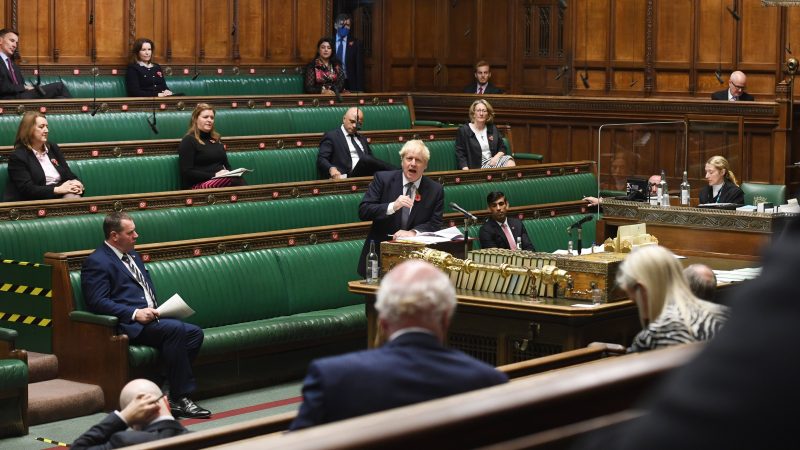
This piece is based on the introduction to a new book from Open Labour and Politics for the Many.
The past year has shown the state’s capacity to swing towards the kind of cronyism beloved of authoritarian regimes. We have a government club with a VIP guest list, used as the basis for handing out contracts, favours and honours. Public procurement becomes a fast-tracked operation for friends, family and donors. We see clampdowns on protest, and plans to warp the voting system for police and crime commissioners and mayors. While Dominic Raab warns that “democracy is in retreat worldwide”, we need to look closer to home.
We face all manner of disasters that force us to re-examine the role of the state and whether it is fit for purpose. From a deadly pandemic to financial turmoil and the brutal effects of climate change, we have become increasingly aware of the power of our communities in rising to the challenge, taking action and protecting each other – and the limitations of the state in its current form to do the same.
The political project of the right in recent years has been about exploiting the feeling of a lack of control over our lives and using it to usher in sweeping ideological changes which exacerbate these concerns rather than address them, using a rhetoric that puts the blame on ‘others’. For the left, the response must be about giving a voice to the diverse communities which make up our society, empowering people in their places of work, addressing inequality and strengthening rights and freedoms to give all of us greater personal stability.
That means a progressive government needs to reimagine the role of the modern state. Central to what we are about is shaking off the dead hands and drag anchors keeping us down and holding us back as individuals, as communities, and as the nations and regions which make up the UK.
The task is to take control from warped institutions of government today, and unleash personal and political empowerment built on inclusion, equality, democracy and accountability. The labour and trade union movement has always led demands for greater democracy, empowering working people and communities, and offering a different vision of society. Today, a reimagined state is central to revitalising and rebuilding our country, and it is an urgent task.
Young people in the UK see too many old institutions that were not fit for the last century never mind this century. Instead, the state exists in a transformed world with huge technological advancements – but it is built upon a creaking democratic structure, and institutions that are only marginally tweaked from their 18th-century versions.
This argument is at the core of The New Foundations, a book released for free this Sunday from Open Labour and Politics for the Many: we have democratic, financial and state institutions that are not fit for purpose.
The inequality and exclusions which come with them are not unfortunate and unavoidable flaws – they are hard-wired in. The effort to undo them, to open up, will be an uphill struggle. A quick makeover or replacing a few bricks in the crumbling edifice won’t do. To build a better society, we will need wide-ranging and fundamental change, not just defending democracy but transforming it.
There will be opposition. Just as the flaws are built in, so are the defensive barriers, because these institutions were not designed to represent everybody fairly. Instead, they were built to defend a particular group or groups of interests and they will fight like hell to keep doing so, as we’ve only too clearly this month.
Real democracy and electoral reform should be a breath of fresh air to tired state institutions: shifting the culture towards bridge-building, rather than divide-and-conquer tactics. As Jess Garland and Willie Sullivan observe in their contribution to this volume, Westminster’s minority-rule electoral system is simply not designed to govern the kind of diverse – and over recent years, increasingly divided – country that the UK has become. As a result, Westminster is increasingly incapable of producing governments underpinned by genuine electoral legitimacy. The divide between the government and the governed is getting starker by the day.
Parliament’s own legitimacy was battered by years of Brexit stalemate, revealing the vulnerability and weaknesses of our largely unwritten constitution and making the foundations of our politics look ever more fragile. Growing mistrust of politics and politicians is opening the door to a resurgent authoritarian right and this poses a huge problem for a Labour Party trying to enthuse voters with a positive vision for change.
This is the context for this collection of new essays. Its primary focus is not on the nuts and bolts of an agenda for democratic reform – although the authors put forward many ideas. Instead, it shows how this agenda is inseparable from Labour’s wider aspirations to transform the country.
Sign up to receive The New Foundations for free. The book will be launched at Open Labour conference on Sunday at 7pm. LabourList readers can use the discount code LabourlistOL21.




More from LabourList
‘Factionalism at the top is weakening Labour – and handing a gift to Reform’
‘Europe must stand strong on its own as US security guarantees grow conditional’
‘Tackling poverty should be the legacy of Keir Starmer’s government’